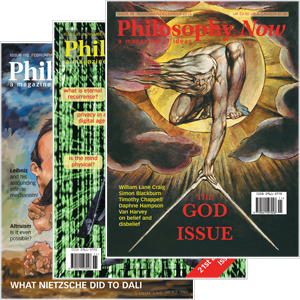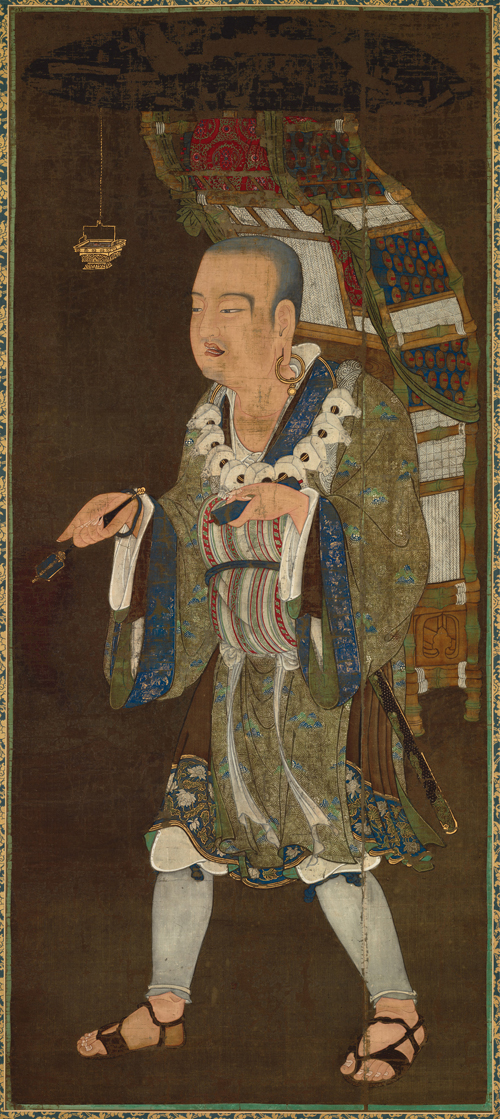玄奘与盖蒂尔问题 |第169期 |现在的理念 --- Xuanzang & the Gettier Problem | Issue 169 | Philosophy Now
- description: Maya Koka journeys through the desert to seek knowledge about knowledge.
- source: url
- author: FOR AUTHORS

Sources of Knowledge 知识来源¶
Xuanzang & the Gettier Problem玄奘与盖蒂尔问题¶
Maya Koka journeys through the desert to seek knowledge about knowledge.玛雅·科卡穿越沙漠,寻求知识知识。¶
The date is 632 AD. The location is Lanzhou, China. The time is precisely 10:00 am. A Buddhist monk named Xuanzang and his companion, a tiger, are journeying through the Gobi Desert. Their mission: to find water. Suddenly they see a valley resembling a blue expanse. Xuanzang turns to his feline friend and remarks, “Look, there is water!” Unfortunately, the glistening blue is a mirage. Yet, when they reach the valley, Xuanzang finds water, hidden beneath a large rock. Did the Buddhist monk know there was water ahead? In other words, is his initial belief that there was water in the valley to be considered knowledge?
日期是公元 632 年。地点是中国兰州。时间正好是上午 10:00。一位名叫玄奘的佛教僧侣和他的同伴一只老虎正在戈壁沙漠中旅行。他们的任务是:寻找水源。突然,他们看到了一个类似蓝色的山谷。玄奘转向他的猫科动物朋友说:“看,有水!不幸的是,闪闪发光的蓝色是海市蜃楼。然而,当他们到达山谷时,玄奘发现了隐藏在一块大石头下的水。佛教僧侣知道前方有水吗?换句话说,他最初相信山谷中有水是否被视为 知识 ?
This situation of Xuanzang’s represents what philosophers these days call a Gettier case. This is a philosophical problem made famous by Edmund Gettier (1927-2021) in an attempt to critique the traditional Socratic or Platonic theory of knowledge as being ‘justified true belief’. On that account, having a belief that is both justified and true is necessary and sufficient for knowledge. If one has a justified true belief, one has knowledge. However, while justified true belief is indeed a necessary conditions for knowledge, Gettier showed that it is not sufficient. He did this by giving various instances in which an agent has a belief both true and justified, yet which fails to be knowledge. I want to look at a novel formulation of the Gettier problem, and also consider a method to respond to Gettier cases through the instantiation of a fourth condition for knowledge.
玄奘的这种情况代表了当今哲学家所说的 盖蒂尔案例 。这是一个哲学问题,埃德蒙·盖蒂尔(Edmund Gettier,1927-2021)试图批评传统的苏格拉底或柏拉图式知识理论,认为这是“合理的真实信仰”。因此,拥有一种既合理又真实的信念对于知识来说是必要和充分的。如果一个人有一个合理的真实信念,他就拥有知识。然而,虽然合理的真实信念确实是知识的必要条件,但盖蒂尔表明这 还不 够。他通过给出各种例子来做到这一点,在这些例子中,代理人拥有真实且合理的信念,但却不是知识。我想研究 Gettier 问题的新颖表述,并考虑一种通过实例化知识的第四个条件来响应 Gettier 案例的方法。
First, how can we know that we have any knowledge at all? Let’s once again revisit 632 AD. According to the justified true belief model, Xuanzang has knowledge of there being water in the valley based on the following conditions:
首先,我们怎么知道我们有任何知识?让我们再次重温公元 632 年。根据正当真信模型,玄奘根据以下条件知道山谷中有水:
a) Xuanzang is justified in believing there is water in the valley because he perceives a blue hue which he registers as water.
a) 玄奘有 理由 相信山谷中有水,因为他感知到一种蓝色,他将其记录为水。
b) Xuanzang believes there is water in the valley.
b) 玄奘 相信 山谷中有水。
c) Xuanzang finds water there, so it is true there is water there.
c) 玄奘在那里找到水,所以 那里确实有 水。
Here ‘justification’ refers to evidential support – such as Xuanzang’s recognition of the blue hue as water. Socrates and later philosophers posited the justification condition to safeguard knowledge claims against luck. A lucky guess doesn’t count as knowledge since there is no good reason to believe it is true.
这里的“正当性”指的是证据支持——例如玄奘承认蓝色色调是水。苏格拉底和后来的哲学家提出了保护知识主张免受运气侵害的正当条件。幸运的猜测不算知识,因为没有充分的理由相信它是真的。

Xuanzang looking for water 14th C. anon.
玄奘寻水 14世纪。
However, it seems that although Xuanzang’s belief was true, this was a lucky coincidence, and not a result of his inference from seeing a blue haze in the valley. Gettier spurred widespread philosophical debate by presenting cases of accidental occurrences of true belief, demonstrating that the idea of knowledge as justified true belief cannot ensure against luck (originally in his brief paper ‘Is Justified True Belief Knowledge?’, Analysis, 1963). I won’t discuss Gettier’s own cases, but I will apply his findings to Xuanzang. Can Xuanzang’s initial claim to knowledge be ruled out by his finding water being simply luck?
不过,似乎玄奘的信念虽然属实,但这只是一个幸运的巧合,并不是他看到山谷中一片蓝色的雾霾而推断出来的结果。盖蒂尔通过提出真实信念偶然发生的案例,引发了广泛的哲学辩论,证明知识作为合理的真实信念的想法不能保证运气(最初在他的简短论文“合理的真实信念知识吗?”, 分析 ,1963 年)。我不会讨论盖蒂尔自己的案例,但我会将他的发现应用到玄奘身上。玄奘最初声称的知识是否可以被他找到水只是运气来排除?
There is no doubt that it is a matter of luck he finds water, as there is no causal relationship between Xuanzang thinking he sees water ahead and his actually finding water. But without a causal relationship between there being water ahead and his belief that there is water ahead, that belief cannot be an instance of knowledge. This underlines the idea that the conditions stated in ‘justified true belief’ are necessary rather than sufficient for knowledge, since knowledge requires more than a belief accidentally being proven correct. Therefore, in response to Gettier cases, several contemporary epistemologists have developed a fourth condition for knowledge: that the truth of a belief must be non-accidental. Theorists such as Alvin Goldman would argue that Xuanzang would only have knowledge if there were a causal connection between his belief that there is water and the fact that there is water (see ‘A Causal Theory of Knowing’, Journal of Philosophy, 1967, 64:12). For Goldman, Xuanzang’s initial belief is not knowledge precisely because although it is true and justified, it is not causally connected to the fact that there actually is water. Specifically, when Xuanzang ‘sees’ water, he is not seeing water, and especially not the water that he will soon find. For this reason, such thinkers argue that belief causality should form the basis of knowledge.
毫无疑问,他找到水是运气问题,因为玄奘认为他看到了前面的水和他实际上找到水之间没有因果关系。但是,如果前方有水与他相信前方有水之间没有因果关系,这种信念就不可能成为知识的实例。这强调了这样一种观点,即“合理的真实信念”中陈述的条件对于知识来说是必要的,而不是足够的,因为知识需要的不仅仅是意外被证明正确的信念。因此,针对盖蒂尔案例,一些当代认识论者提出了知识的第四个条件:信念的真实性必须 是非偶然 的。阿尔文·戈德曼等理论家认为,只有当玄奘相信有水与存在水的事实之间存在因果关系时,玄奘才会拥有知识(参见“认识的因果理论”, 《哲学杂志 》,1967 年,64:12)。对于戈德曼来说,玄奘最初的信念并不是知识,正是因为它虽然真实且合理,但它与实际存在水这一事实没有因果联系。具体来说,玄奘“看到”水的时候,他不是看到水,尤其是不是他很快就会找到的水。出于这个原因,这些思想家认为信念因果关系应该构成知识的基础。
This causal theory of knowledge is well-intentioned, of course, but it is not exempt from flaws. According to Grefte and Gebharter in ‘The Causal Theory of Knowledge Revisited: An Interventionist Approach’ (Ratio, 2021, 34:3), even if an individual’s belief is causally connected to the truth formulated by the belief, it is still possible for the believer to lack knowledge. For example, let’s suppose that Xuanzang does not see a mirage ahead, but instead sees a real body of water. Let’s also suppose that due to local climatic conditions in Lanzhou there are numerous mirages, which do not contain any water but from a distance are indistinguishable from real water. By chance, Xuanzang is presently looking at the only genuine lake in Lanzhou. For Goldman, Xuanzang’s belief would count as knowledge, because it is caused by there actually being a body of water ahead. Yet we can plausibly assert that Xuanzang’s belief does not actually qualify as knowledge because it arises out of epistemic luck. If he had been looking at one of the many mirages instead, his belief would have been false. There is, therefore, reason to reject a simple causal theory of knowledge for the same reason we rejected justified true belief, namely its inability to ensure against accidental occurrences.
当然,这种知识因果理论的初衷是好的,但它也不能免于缺陷。根据 Grefte 和 Gebharter 在《重新审视知识的因果理论:一种干预主义方法》(Ratio,2021,34:3)中的说法,即使个人的信念与该信念所形成的真理有因果关系,信徒仍有可能缺乏知识。例如,假设玄奘没有看到前方的海市蜃楼,而是看到了真实的水体。我们还假设,由于兰州当地的气候条件,海市蜃楼众多,它们不含任何水,但从远处看与真水没有区别。一次偶然的机会,玄奘目前正在看兰州唯一的正牌湖泊。对于戈德曼来说,玄奘的信念将算作知识,因为它是由前方实际上有一片水域引起的。然而,我们可以合理地断言,玄奘的信念实际上并不符合知识的条件,因为它是出于 认识运气 。如果他看到的是众多海市蜃楼中的一个,他的信念就会是错误的。因此,有理由拒绝简单的因果知识理论,原因与我们拒绝合理的真实信念相同,即它无法确保不会发生意外事件。
So even justified true belief plus the causal theory of knowledge fail to sufficiently define knowledge. Yet although Xuanzang never attained knowledge in his journey through the Gobi Desert, his quest marks an illuminating shift in epistemology. Too often, Gettier cases are viewed as philosophical diamonds, unanimously favored in contemporary debates. But the story of Xuanzang illuminates a complex tension between knowledge and epistemic luck, bringing us one step closer to realizing what it means to truly know.
因此,即使是合理的真实信念加上知识的因果理论 也 无法充分定义知识。然而,尽管玄奘在戈壁沙漠之旅中从未获得知识,但他的探索标志着认识论的启发性转变。盖蒂尔案常常被视为哲学钻石,在当代辩论中得到一致青睐。但玄奘的故事揭示了知识与认识运气之间的复杂张力,让我们离实现真正 认识 的意义又近了一步。
© Maya Koka 2025
© 玛雅·科卡 2025
Maya Koka is a Foundation Scholar studying philosophy in the International Dual BA program between Columbia University and Trinity College Dublin.
Maya Koka 是一名基础学者,在哥伦比亚大学和都柏林三一学院之间的国际双学士学位课程中学习哲学。